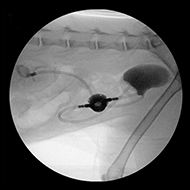
Researchers analyse the medical records of 95 cats fitted with SUB devices.
Subcutaneous ureteral bypass (SUB) placement is associated with a high complication rate, according to new research.
The study, published in the Journal of Small Animal Practice (JSAP), found that most of these complications are manageable, resulting in an average survival time of over two years. It also suggests that imaging techniques, such as fluoroscopy, are useful in identifying complications.
In the study, researchers analysed the medical record of 95 cats fitted with SUBs between April 2012 and June 2017. The information recorded included imaging modality used for diagnosis, whether urethral catheterisation was performed and whether obstruction was uni- or bilateral.
They found that minor complications - defined as infection or technical problem which resolved with none or minor treatment - occurred in 19 per cent of the cats. Major complications - defined as infection or technical problem resulting in revision surgery, removal of the SUBs or death/euthanasia – occurred in 48 per cent of the cats. Eleven per cent of cats analysed in the study did not survive to discharge.
Dr Nicola Kulendra, lead author for the paper said: “A significant association between long-term survival and creatinine at presentation was identified. The median survival time for cats presenting with creatinine concentration ≥440 μmol/L (International Renal Interest Society stage acute kidney injury (AKI) 4 and 5) was 530 days, compared to a median survival time of 949 days for those cats presenting with creatinine <440 μmol/L (International Renal Interest Society stage AKI 1–3).”
JSAP editor Nicola Di Girolamo, concluded: “Veterinary medicine is advancing fast and it is exciting to see treatment options that just a decade ago were rarely considered are now accessible to many of our patients. Furthermore, it is excellent to see the veterinary sector is publishing articles of this nature, demonstrating the risks and complications of a procedure, to support proper discussion with owners and referring veterinarians.”
Image © BSAVA Manual of Canine and Feline Abdominal Surgery 2nd Ed.



 The latest
The latest